On Autism and Diagnosis:
A final point on whether or not Jenny's son truly did have autism is on how his diagnosis came to be. Apparently, he was diagnosed by the "best doctor" in town or some such. Even the best doctors can make misdiagnoses, and even mistakes. Part of this depends on the information he is receiving, either from the parents or from other physicians. The other part is the doctor's own experiences through his education, training, and with other patients. Evan may very well have appeared autistic in this physician's office. He was lining objects up and flapping. With such an observation, combined with a history of speech delay and seizures, it's not hard to see how the diagnosis of autism could be reached.
However, I feel it's important to note that this was a second opinion. Ms. McCarthy wasn't happy with the epilepsy diagnosis she had received from a previous doctor. It's possible that autism clicked with her (she herself says "this man is right," see below), an autism diagnosis made more sense to her perhaps. It was a diagnosis that tied up those loose ends she was concerned about (the stimming, the language loss, etc.). I know we felt a certain sigh of relief when given particular diagnoses for our daughter. It was a "oh, now I get it" reaction. There was information to be given, some resolution, and sometimes more resources. It may seem odd to people who don't have children with health or developmental issues, why a parent would feel an ounce of relief from a diagnosis. But, as a parent, we often see a new diagnosis as something that wraps our concerns up in a nice, neat package. It almost makes the issues we are facing easier to consume and easier to understand.
From Jenny's interview on Oprah:
Two days later, a doctor diagnosed Evan with epilepsy. "[The doctor said], 'There's got to be someone with seizures on your side of the family.' I said, 'No, actually I know every branch. I know what's going on. There's nothing. No one [with] epilepsy," she says. "And they discharged us." Jenny says every instinct she had was telling her that her son was not epileptic—so she went for a second opinion. After spending 20 minutes with Evan, a neurologist gave Jenny what she describes as a devastating diagnosis—Evan had autism. "And boy, my mommy instinct said, 'This man is right,'" she says.I realize there are doctors so familiar with autism, they can apparently look at a child and give a fairly accurate diagnosis. That being said, do you want a "fairly accurate" diagnosis for your child, or a diagnosis based on hours of observation and information gathering? Our daughter had been followed by a neurologist for almost 3 years before we went for the official autism evaluation. She already had many diagnoses (apraxia, sensory processing disorder, developmental delay, static encephalopathy, and so on), and was receiving therapy for her needs. However, it was apparent her social and behavioral issues, combined with everything else, warranted an autism evaluation (to give us an answer, and to assist her in receiving proper school services, etc.).
With a rather hefty folder filled with records from our child's pediatrician, multiple specialists (including neurologist and geneticist), and her therapists, we headed into the psychologist's office. This psychologist was one of two "autism experts" in our area. She is one of those who can look at a child, and fairly accurately say autism or not. Still, she insisted on asking my husband and I questions, have us fill out surveys (together and separate, with her and at home), reviewing our child's extensive records, and interacting and attempting to play with my child. This was clearly a responsible thing to do. She was better able to educate us on autism (and specifically what that meant to our daughter), intervention and school recommendations, medications, and so on.
We went for 3 hour-long appointments, over the course of 3 weeks. And then, at the end of the month, we went back for our last appointment. We were handed a multiple page document, and the doctor reviewed her diagnosis (moderate autism, with a history indicative of moderate to severe autism). I have to say, I'd prefer to commit to 4 hours of testing and discussing to come to a diagnosis than 20 minutes of observing and asking questions.
Since a third opinion was never sought, it seems, we can't know what yet another physician would draw from Evan's case. Would the next doctor feel that his severe seizures had affected his language, and that perhaps he did have other neurological manifestations? We can't say for certain, but again, it could be a possibility.
*Disclaimer: I do not have any personal knowledge of Jenny McCarthy or her son's medical history, other than that made available to the public (via media outlets, et al). These are simply questions I feel worth raising, and ideas worth investigating.
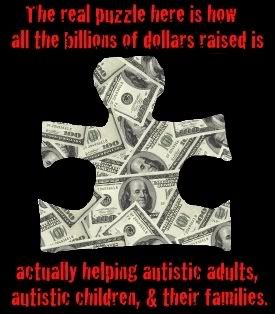







 This Way of Life
This Way of Life

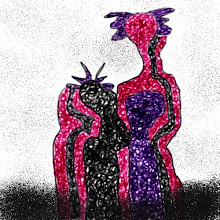

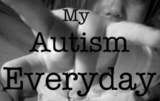





 "Autism is a way of being. It is pervasive; it colors every experience, every sensation, perception, thought, emotion, and encounter, every aspect of existence. It is not possible to separate the autism from the person."
- Jim Sinclair
"Autism is a way of being. It is pervasive; it colors every experience, every sensation, perception, thought, emotion, and encounter, every aspect of existence. It is not possible to separate the autism from the person."
- Jim Sinclair









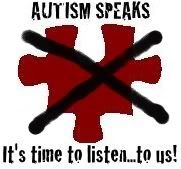












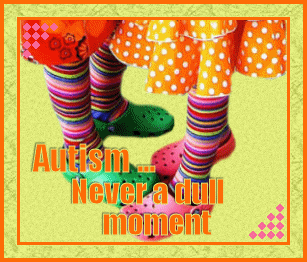

5 comments:
""And boy, my mommy instinct said, 'This man is right,'" she says."
Jenny earlier:
"The day I found out I was an adult Indigo will stay with me forever. I was walking hand in hand with my son down a Los Angeles street when this women approached me and said, “You’re an Indigo and your son is a Crystal.” I immediately replied, “Yes!”"
More "mommy instinct". Perhaps that 3rd opinion....?
plus shes 'forgotten' to mention she made her kid wear a skull squashing/brain injuring helmet for the first year of his life cause she didnt like his square head and wanted him to have a normal skull shape.
The kid had brain injury because of that
why has that not been picked up by the media?
Whether or not you believe the doctors at the UCLA center for autism,r recognized internationally for their work with autistic children were right, or if you think Jenny is lying, or whatever...... Jenny McCarthy has singlehandedly done more for the children with autism that every oher organization combined becuase of her celebrity status.
Kudos to her.
And, shame on you. If your child was diagnosed with cancer, and then was healed, did he really have cancer?
Autism is treatable.
well, the best way to help an Autistic child is the Institutes for the Achievement of Human Potential, a Philadelphia nonprofit that teaches a treatment program for the condition.
http://www.iahp.org
jypsy: Yes, perhaps that was the 3rd opinion!
Anon #1: I had never heard of a brain injury occurring from a helmet. In fact, from what I know about the condition, if left untreated, it can cause problems.
Anon #2: I respectfully disagree--she has not done anything for autism or autistics. Her message is "Green Our Vaccines," vaccine injury, and recovery. Nice try though.
I despise any cancer-autism analogies. And, in your example, there is no comparison. Cancer is a disease, one that is diagnosed by laboratory testing (not observations). And, actually the term is "in remission" and not cure for a person found to no longer have cancer in their system. It's apples to oranges. There are sadly, cases of cancer misdiagnosis--records get mixed up or tests are misread. In that case, after a round of treatment, if it was found this patient never really had cancer to begin with--then and only then, would it mean they never had cancer. The treatment would be moot, the patient never required it and it had zero affect on the patient. Two entirely different things.
Post a Comment